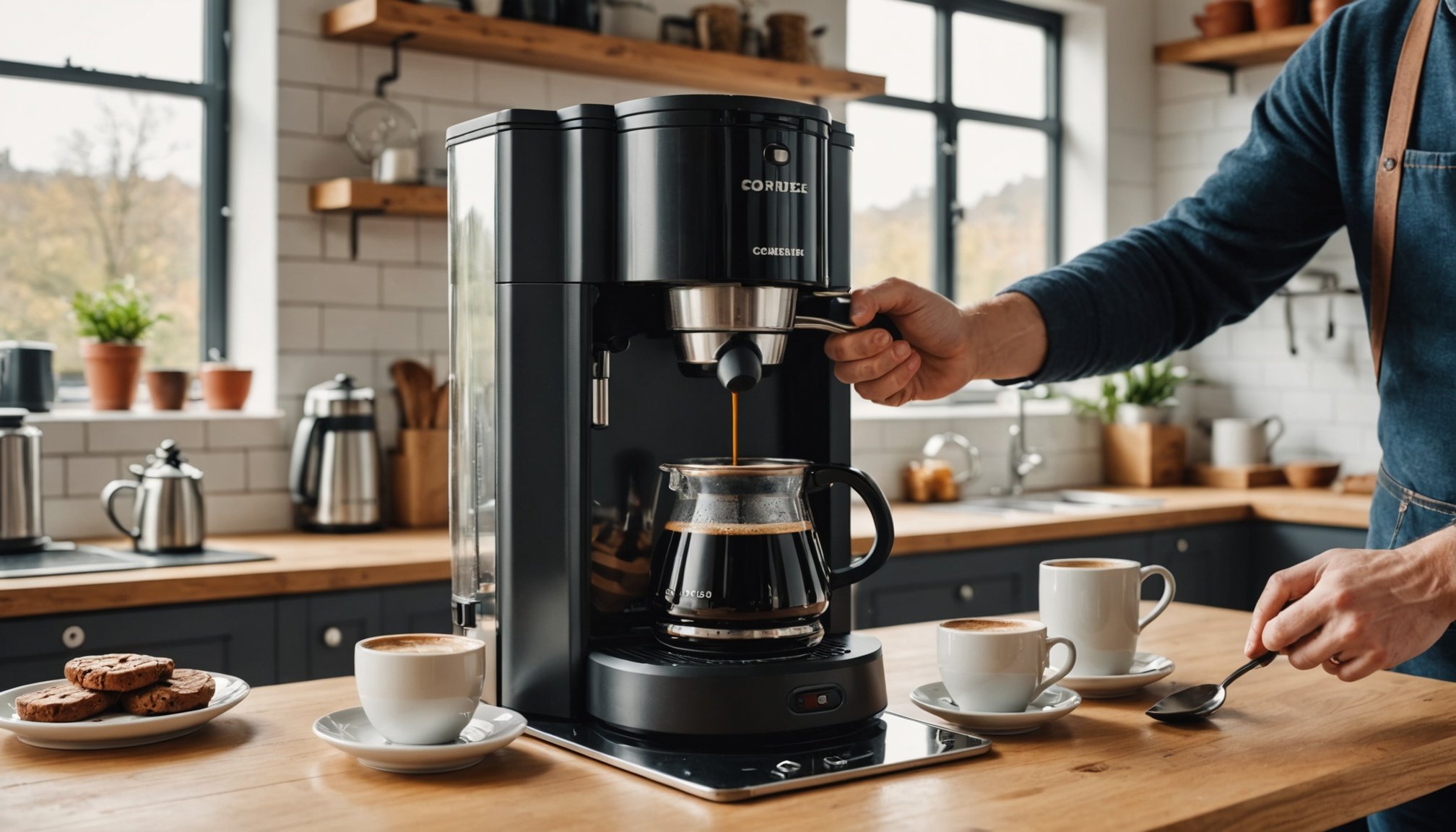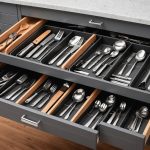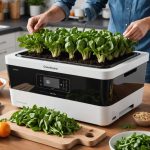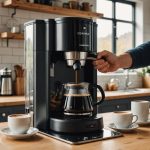Choosing an eco-friendly coffee maker is vital for those committed to sustainable living in the UK. With countless options available, understanding energy efficiency, materials, and waste reduction will help you make an informed decision. This guide highlights essential features and practical tips to consider, ensuring your morning brew aligns with your environmental values. Transitioning to a greener brewing method can be seamless and rewarding—let’s explore how to make it happen.
Overview of Eco-Friendly Coffee Makers
Understanding the shift towards sustainability in coffee brewing
Also to read : Discover the Ultimate Drawer Organizer for Storing Oversized Utensils Efficiently!
Definition and Importance
Eco-friendly coffee makers are designed to reduce environmental impact by minimizing waste and energy consumption. Unlike traditional models, these sustainable coffee machines often incorporate materials that are recyclable or biodegradable, contributing to a greener planet. The significance of these devices lies in their ability to support eco-conscious living without compromising on the quality of your morning brew.
Environmental Impact of Traditional Coffee Makers
Traditional coffee makers can have a substantial environmental footprint. They often use non-recyclable materials and consume significant amounts of energy. This contributes to increased waste and higher carbon emissions. Switching to a sustainable coffee machine can mitigate these issues, offering a more environmentally responsible alternative.
Additional reading : Discover the Ultimate Drawer Organizer for Storing Oversized Utensils Efficiently!
Benefits of Eco-Friendly Options
Choosing an eco-friendly coffee maker offers several advantages. These machines often feature energy-saving modes and reusable filters, reducing both electricity use and waste. Here are some benefits:
- Reduced Energy Consumption: Many models have energy-efficient settings.
- Minimized Waste: Use of biodegradable or reusable components.
- Sustainable Materials: Constructed with eco-friendly materials.
By opting for a sustainable coffee machine, you contribute to a healthier planet while enjoying your favorite beverage.
Types of Eco-Friendly Coffee Makers
Exploring sustainable brewing methods for a greener cup
Drip Coffee Makers
Drip coffee makers are a popular choice for many coffee enthusiasts seeking sustainability. These machines often feature energy-efficient settings and use reusable filters, which significantly reduce waste. By opting for a drip coffee maker with a programmable timer, users can minimize energy consumption by brewing only when needed. The use of sustainable materials in their construction further enhances their eco-friendly credentials.
French Press
The French press is a classic method that aligns well with sustainable brewing. It requires no electricity, relying solely on manual operation. This simplicity means fewer components and less waste. Using a French press, coffee lovers can enjoy a rich, full-bodied brew while minimizing their environmental impact. The absence of disposable filters and pods makes it an ideal choice for those prioritizing waste reduction.
Pour-Over Coffee Makers
Pour-over coffee makers offer a hands-on approach to sustainable brewing. They typically use biodegradable filters and allow for precise control over water usage, which can lead to reduced energy consumption. This method encourages mindful brewing, with users often selecting locally sourced beans to further their eco-friendly efforts. The pour-over technique is celebrated for its ability to produce a clean, flavorful cup without the environmental drawbacks of traditional machines.
Key Features to Look For
Discover essential attributes for sustainable coffee brewing
Energy Efficiency
When selecting a coffee maker, prioritize models with high energy efficiency ratings. These machines consume less power, contributing to lower electricity bills and reduced carbon footprints. Look for features such as automatic shut-off and programmable timers that enhance energy conservation.
Sustainable Materials
Opt for coffee makers constructed with recyclable or biodegradable materials. These sustainable features ensure that the device has a minimal environmental impact throughout its lifecycle. Components made from stainless steel or glass, rather than plastic, are preferable for their durability and recyclability.
Easy Maintenance
A design that allows for easy cleaning and maintenance can significantly extend the lifespan of your coffee maker. Models with removable parts simplify the cleaning process, reducing the need for harsh chemicals. This not only preserves the machine but also aligns with sustainable living practices.
Essential Features Checklist
- Energy Efficiency Ratings: Look for high ratings and power-saving modes.
- Recyclable Materials: Prefer models using glass or stainless steel.
- Ease of Cleaning: Removable parts for hassle-free maintenance.
By focusing on these sustainable features, you can enjoy a superior brewing experience while supporting environmental sustainability. Choose wisely to make a positive impact on your daily coffee ritual.
Popular Eco-Friendly Brands in the UK
Exploring top choices for sustainable coffee makers
Overview of Leading Brands
The UK market offers a variety of eco-friendly coffee brands that cater to environmentally conscious consumers. Brands like EcoBrew, GreenBean, and SustainCup lead the way with innovative designs and sustainable practices. These sustainable coffee makers UK are crafted to minimize environmental impact while delivering exceptional performance.
Highlighted Models and Features
EcoBrew's EcoDrip model is renowned for its energy efficiency and use of biodegradable materials. GreenBean's EcoPress offers a manual brewing experience, eliminating electricity use. SustainCup's EcoPour features reusable filters, reducing waste significantly. These models showcase the commitment of eco-friendly coffee brands to sustainability.
Consumer Reviews and Ratings
Consumer feedback highlights the practicality and efficiency of these sustainable coffee makers UK. EcoBrew's EcoDrip receives praise for its energy-saving features, while GreenBean's EcoPress is favored for its simplicity and waste reduction. SustainCup's EcoPour is noted for its durability and ease of maintenance.
Consumer Ratings Summary
- EcoBrew EcoDrip: 4.7/5 for energy efficiency
- GreenBean EcoPress: 4.5/5 for manual operation
- SustainCup EcoPour: 4.6/5 for reusable components
Choosing from these eco-friendly coffee brands ensures a sustainable and satisfying coffee experience in the UK.
Tips for Sustainable Coffee Making
Sustainable coffee tips for eco-friendly brewing practices
Reducing Waste During Brewing
To embrace sustainable coffee tips, focus on minimizing waste. Opt for reusable filters or a French press to eliminate disposable paper filters. Consider composting coffee grounds, which enrich soil and reduce landfill waste. A simple switch to biodegradable coffee bags can further reduce your footprint.
Sourcing Sustainable Coffee Beans
Selecting sustainable coffee beans is crucial for eco-friendly brewing. Look for certifications like Fair Trade or Rainforest Alliance, which ensure ethical and environmentally responsible practices. Purchasing beans from local roasters reduces carbon emissions associated with transportation. Choose organic coffee to support farming methods that avoid harmful pesticides and promote biodiversity.
Maintaining Your Coffee Maker
Proper maintenance extends the life of your coffee maker, aligning with sustainable living. Regular descaling prevents mineral build-up, enhancing efficiency. Clean removable parts with natural solutions like vinegar to avoid harsh chemicals.
Maintenance Checklist
- Descale Regularly: Prevents build-up and maintains efficiency.
- Use Natural Cleaners: Vinegar or baking soda for eco-friendly cleaning.
- Check for Wear: Replace parts as needed to prolong lifespan.
By integrating these sustainable coffee tips into your routine, you contribute to a greener planet while enjoying your daily brew.
Understanding Certifications
Exploring eco-certifications to make informed choices
Common Eco-Certifications
Eco-certifications play a crucial role in identifying sustainable products. They ensure that a coffee maker meets specific environmental standards. Common certifications include Energy Star, which highlights energy efficiency, and Cradle to Cradle, which focuses on sustainable product lifecycle. These certifications provide a reliable measure of a product's eco-friendliness, aiding consumers in making responsible choices.
Importance for Consumers
For environmentally conscious buyers, eco-certifications offer assurance that a product aligns with their values. They serve as a mark of quality and sustainability, reducing the need for extensive research. Certifications like Fair Trade and Rainforest Alliance further ensure ethical sourcing and manufacturing practices, contributing to a more sustainable world.
Verifying Certifications
When purchasing a coffee maker, it's essential to verify the eco-certifications. Check for official logos on packaging and consult the certifying body's website for authenticity. This step ensures that the product genuinely adheres to sustainable standards.
- Energy Star: Indicates energy efficiency
- Cradle to Cradle: Focuses on sustainable lifecycle
- Fair Trade: Ensures ethical sourcing
By understanding and verifying these eco-certifications, consumers can confidently select sustainable products that support their environmental goals.
Cost Considerations
Analyzing the financial aspects of eco-friendly coffee makers
Average Price Range
When considering an eco-friendly coffee maker, it's important to understand the typical price range. These sustainable coffee machines generally range from £50 to £300, depending on features and brand. While the initial investment might seem higher than traditional models, the benefits often justify the cost.
Long-Term Savings
Investing in an eco-friendly coffee maker can lead to significant long-term savings. Thanks to energy efficiency, these machines reduce electricity bills. A model with energy-saving features can lower energy consumption by up to 30%, offering financial relief over time. The use of reusable filters also cuts down on the recurring cost of disposables.
Cost-Benefit Analysis
A thorough cost-benefit analysis reveals the advantages of choosing a sustainable coffee machine. While upfront costs may be higher, the reduction in energy usage and waste offers substantial savings. Consider these factors:
- Initial Cost: Higher than traditional models
- Energy Savings: Up to 30% reduction in energy bills
- Waste Reduction: Savings from reusable components
By evaluating these factors, consumers can make informed decisions, balancing initial expenses with long-term benefits. Opting for an eco-friendly coffee maker not only supports the environment but also proves financially prudent in the long run.
Energy Efficiency and Impact
Exploring the role of energy-efficient coffee makers in sustainability
Energy Efficiency and Sustainability
Energy-efficient coffee makers are pivotal in enhancing overall sustainability. By reducing energy consumption, these machines lower carbon footprints and contribute to environmental conservation. The impact of sustainable energy use is profound, as it not only benefits the planet but also results in cost savings for the consumer.
Comparison of Energy Consumption
Different coffee makers vary in their energy use. For instance, a traditional drip coffee maker may consume more energy compared to a French press or pour-over coffee maker. Here's a simple comparison:
| Coffee Maker Type | Average Energy Use (kWh) |
|---|---|
| Drip | 1.0 |
| French Press | 0.1 |
| Pour-Over | 0.2 |
Tips for Optimizing Energy Use
To further enhance sustainable energy use, consider these tips:
- Use a programmable timer: Brew only when needed.
- Opt for manual methods: Choose a French press or pour-over.
- Regular maintenance: Keeps the machine running efficiently.
By understanding and implementing these strategies, consumers can maximize the benefits of energy-efficient coffee makers, supporting both their wallets and the environment.
Recycling and Disposal Options
Exploring eco-friendly solutions for end-of-life coffee makers
Recycling Programs
Many manufacturers and retailers offer recycling programs specifically for coffee makers. These programs ensure that your old machine is processed in an environmentally responsible manner. Check with local waste management facilities to see if they accept small appliances for recycling. Participating in these programs helps divert waste from landfills and recover valuable materials.
Proper Disposal Guidelines
When it comes to eco-friendly disposal, it is crucial to follow specific guidelines. Remove all detachable parts and separate materials like plastic and metal. Some components may need special handling due to electronics. Consult your local council for advice on disposing of e-waste responsibly. Proper disposal not only aids in environmental conservation but also complies with legal requirements.
Creative Repurposing Ideas
For those inclined towards creativity, consider repurposing parts of your old coffee maker. Here are some inspiring ideas:
- Craft projects: Use metal or plastic parts for art or home decor.
- Planters: Convert carafes or water tanks into plant holders.
- Storage solutions: Utilize smaller components for organizing small items.
By exploring these recycling and disposal options, you contribute to a sustainable cycle, transforming waste into new opportunities.
Frequently Asked Questions
Clarifying common concerns about eco-friendly coffee makers
Common Concerns
Many potential buyers have questions about eco-friendly coffee makers. A frequent concern is whether these machines compromise on performance. Rest assured, many models offer the same brewing quality as traditional options, with the added benefit of sustainability. Another question is about the availability of sustainable coffee options. Consumers can find a variety of brands that align with eco-friendly principles.
Clarifications on Myths
There are misconceptions surrounding sustainable coffee brewing. One myth is that these machines are significantly more expensive. While initial costs can be higher, the long-term savings on energy and waste often offset the price. Another myth is that eco-friendly coffee makers are difficult to maintain. In reality, many are designed for ease of cleaning, with reusable filters simplifying the process.
Guidance for First-Time Buyers
For those new to sustainable coffee options, here are some tips:
- Research Features: Look for energy-efficient models and reusable components.
- Verify Certifications: Check for eco-certifications to ensure sustainability.
- Consider Long-Term Benefits: Evaluate potential savings on energy and waste.
These insights empower consumers to make informed decisions, ensuring a satisfying and responsible coffee experience.













